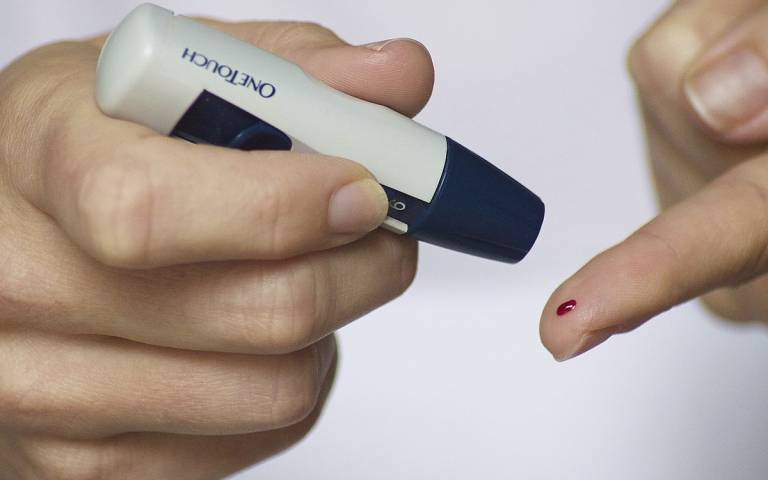Prediabetes may be linked to worse brain health
12 February 2021
People with prediabetes, whose blood sugar levels are higher than normal, may have an increased risk of cognitive decline and vascular dementia, according to a new study led by UCL researchers.

For the study, published in the journal Diabetes, Obesity and Metabolism, researchers analysed data from the UK Biobank of 500,000 people aged 58 years on average, and found that people with higher than normal blood sugar levels were 42% more likely to experience cognitive decline over an average of four years, and were 54% more likely to develop vascular dementia over an average of eight years (although absolute rates of both cognitive decline and dementia were low).
The associations remained true after other influential factors had been taken into account – including age, deprivation, smoking, BMI and whether or not participants had cardiovascular disease.
People with prediabetes have blood sugar levels that are higher than usual, but not high enough to be diagnosed with type 2 diabetes. It means they are more at risk of developing diabetes. There are an estimated five to seven million people* with prediabetes in the UK.
Lead author Dr Victoria Garfield (UCL Institute of Cardiovascular Science and the UCL MRC Unit for Lifelong Health & Ageing) said: “Our research shows a possible link between higher blood sugar levels – a state often described as ‘prediabetes’ – and higher risks of cognitive decline and vascular dementia. As an observational study, it cannot prove higher blood sugar levels cause worsening brain health. However, we believe there is a potential connection that needs to be investigated further.
“Previous research has found a link between poorer cognitive outcomes and diabetes but our study is the first to investigate how having blood sugar levels that are relatively high – but do not yet constitute diabetes – may affect our brain health.”
In the study, researchers investigated how different blood sugar levels, or glycaemic states, were associated with performance in cognitive tests over time, dementia diagnoses, and brain structure measured by MRI scans of the brain. Each of these measures were limited to smaller subsets of the Biobank sample (for instance, only 18,809 participants had follow-up cognitive tests).
At recruitment all of the UK Biobank participants underwent an HbA1c test, which determines average blood sugar levels over the past two to three months. Participants were divided into five groups on the basis of the results - “low-normal” level of blood sugar, normoglycaemia (having a normal concentration of sugar in the blood), prediabetes, undiagnosed diabetes and diabetes. A result between 42-48 mmol/mol (6.0-6.5%) was classified as prediabetes.
The researchers used data from repeated assessments of visual memory to determine whether participants had cognitive decline or not. Though absolute rates of cognitive decline were low, people with prediabetes and diabetes had a similarly higher likelihood of cognitive decline – 42% and 39% respectively.
Looking at dementia diagnoses, researchers found that prediabetes was associated with a higher likelihood of vascular dementia, a common form of dementia caused by reduced blood flow to the brain, but not Alzheimer’s disease. People with diabetes, meanwhile, were three times more likely to develop vascular dementia than people whose blood sugar levels were classified as normal, and more likely to develop Alzheimer’s disease.
Senior author Professor Nishi Chaturvedi (UCL MRC Unit for Lifelong Health & Ageing) said: “In this relatively young age group, the risks of cognitive decline and of dementia are very low; the excess risks we observe in relation to elevated blood sugar only modestly increase the absolute rates of ill health. Seeing whether these effects persist as people get older, and where absolute rates of disease get higher, will be important.
“Our findings also need to be replicated using other datasets. If they are confirmed, they open up questions about the potential benefits of screening for diabetes in the general population and whether we should be intervening earlier.”
Among 35,418 participants of the UK Biobank study who underwent MRI brain scans, researchers found that prediabetes was associated somewhat with a smaller hippocampus and more strongly associated with having lesions on the brain (white matter hyperintensities, WMHs) – both associated with age-related cognitive impairment.
The researchers said that some of these differences could be explained by elevated blood pressure, as those participants taking antihypertensive medication were likely to have more WMHs and smaller hippocampal volume. Rather than the treatment having an adverse effect on the brain, the researchers said use of such medication might be an indicator of earlier untreated high blood pressure.
People with prediabetes can reduce their risk of developing type 2 diabetes by eating a healthy, balanced diet, being more active, and staying at a healthy weight.
https://www.diabetes.co.uk/pre-diabetes.html
Links
- Full paper
- Dr Victoria Garfield’s academic profile
- Professor Nishi Chaturvedi’s academic profile
- UCL Institute of Cardiovascular Science
- UCL MRC Unit for Lifelong Health & Ageing
- UCL Population Health Sciences
- UK Biobank
Image
- A person testing their blood sugar level. Source: Pixabay. Creative Commons Zero
Media contact
Mark Greaves
T: +44 (0)7990 675947
 Close
Close

